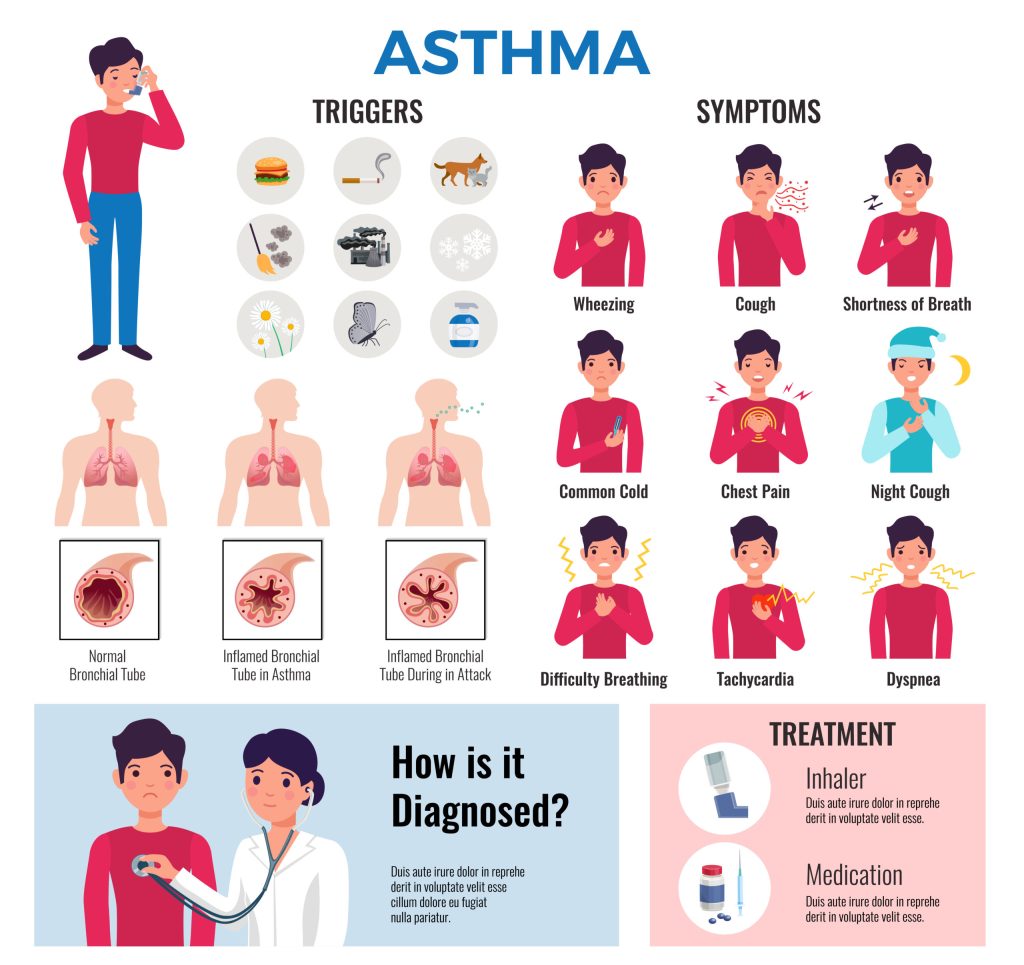Can Severe Asthma Cause Chest Pain? Get All Your Answers Here!
On a lovely sunny day, you went hiking with your friends. Everything was fine until one of them began to gasp for air. They find it hard to speak, and their face starts to turn pale! You’re clueless about what’s happening, and none of your friends even know what to do. Well, such a terrifying scenario occurs with people struggling with asthma. It can sometimes also happen without any warning. Learning about asthma, what causes asthma, and how to prevent an asthma attack or manage it can be the only difference between a great day with your friends and an emergency room. Even severe asthma can be managed with the correct knowledge. Keep reading and stay well-informed for yourself and your loved one!
What is Asthma?
It is a chronic lung condition that leads to frequent breathing issues. It can affect people of all ages, often starting in childhood but can even start in adulthood. As of now, there’s no cure, but a few simple tips to control the signs of asthma. This helps asthma patients to live a fulfilling life. Severe asthma can have serious complications, and you must see a healthcare professional right away. The WHO estimates that over 339 million people worldwide are currently affected by asthma, with the majority of deaths occurring among older adults (Source: WHO, 2020).
Types of Asthma
Asthma is categorized into 2 main types. This depends on what triggers it and how severe the asthma symptoms are. It is classified as:
- Intermittent: This comes and goes, with normal breathing in between flare-ups.
- Persistent: In this type, you have the symptoms most of the time. They can vary from mild to severe asthma. Your healthcare professional determines the severity on the basis of how frequent the symptoms are and how they impact your daily life.
Different Causes of Asthma
- Allergic: Allergies in a few patients can cause an asthma attack. Allergens like pet dander, pollen, and mold.
- Non-allergic: Stress, getting sick, exercise, and weather changes can lead to asthma flare-ups
It can even be classified by when it starts:
- Adult-onset: This begins when you turn 18.
- Pediatric: It is also called childhood asthma. This typically starts before age 5 and can also occur in babies.
Some other Types of Asthma
- Exercise-induced asthma: This is mainly triggered by physical activity.
- Occupational asthma: This usually impacts those whose work exposes them to some irritating substances.
- Asthma-COPD overlap syndrome (ACOS): This happens when you have both COPD (chronic obstructive pulmonary disease and asthma, making breathing difficult for you.
What is an Asthma Attack?

Usually, when you breathe, the muscles around the airways stay relaxed. This allows air to move in and out without any problem. But at the time of an asthma attack, some things go wrong.
- Bronchospasm: Your airway muscles squeeze tight, making the tubes narrower. It makes it challenging for the air to flow through.
- Inflammation: The lining of the airways gets swollen. This narrows down the air space even more.
- Mucus production: Your body makes extra mucus, which may clog your airways.
All these things make it tough for you to breathe, and you may hear a wheezing sound. Severe asthma attacks can also be known as flare-ups. This means your asthma is acting up.
Symptoms of Asthma
If you might have asthma, you can notice clear signs. These may seem similar to other breathing issues or cold.
- Pressure, tightness, or pain in your chest
- Coughing (worse at night)
- Feeling like you are short of breath
- Wheezing
You may not encounter all these symptoms each time you have an asthma attack. But ignoring them might lead to severe asthma.
How to Prevent Asthma Attacks?
Learn about your triggers and try to avoid them.
- Allergies: If things such as pollen or dust trigger your asthma, try your best to keep yourself away from them.
- Smoke: If you smoke, then quitting it right away can help you prevent flare-ups. Also, avoid secondhand smoke. Smoking is one of the major risk factors for severe asthma.
- Weather: If instant changes in weather or cold air bother your lungs, wear a scarf over your face during such times.
- Illness: The flu and colds can worsen your asthma. Get a flu vaccine each year, avoid contact with sick people, and wash your hands often.

FAQs
Can asthma go away?
Asthma doesn’t go away fully. A few kids might have fewer symptoms as they age, but they still have asthma.
Why is my asthma worse at night?
This is called Nighttime Asthma. The reason for this is not definite but some guesses are like medication side effects, too hot or too cold environment, something in bedroom that triggers it, lungs function lessen at night.
How do I know whether I have Asthma or not?
You need to visit healthcare professional to know whether you are suffering from Asthma. As there are some similar respiratory conditions that may also cause chest pain and cough
How to stop asthma cough?
Knowing the Root Cause:
- Doctor’s plan: Work with your healthcare professional to address triggers and make an asthma treatment plan. This often includes medication.
- Medication: Inhalers are key – a rescue inhaler for immediate relief and a controller inhaler for prevention. Other medications may also help.
- Lifestyle: Avoid your triggers and focus on healthy habits like managing stress and not smoking.
- Natural Remedies (with caution): Warm fluids, humidity, and specific breathing exercises might offer temporary relief alongside your medication.
Can asthma cause chest pain?
If you’re struggling with severe asthma, your body can react to specific things. This makes the airways get irritated and swollen. Due to this, you might feel that your chest is heavy or tight. Research shows that chest pain, with other uncommon feelings, often occurs during or before an asthma attack.
Can smoking cause asthma?
Smoking is one of the main risk factors for severe asthma. Even second-hand smoke can lead to an asthma attack.
How Cellmaflex helps:
Cellmaflex is an all-in-one digital healthcare hub for the patients. With Cellmaflex, patient can sign up free and easily find a suitable healthcare provider. In one click, patients can browse through the directory of the specialists they can see, check the availability of their preferred doctors, and even book appointments online without having to make any calls or waste hours in waiting rooms.
Direct results of the tests can be accessed by the patients, anywhere, at any time. In addition, patients can locate pharmacies nearest to them through Cellmaflex. This ensures prompt availability of various medications and supplements that may aid in better management.
Cellmaflex empowers patients to take charge of their health with smooth appointment scheduling, rapid viewing of test results, and even hassle-free coordination with specialists for the required care. Cellmaflex provides patients with the support they need every step of their journey.
Asthma can be a scary condition! Understanding asthma, recognizing the symptoms, and knowing your triggers will help you manage it. If you’re concerned about asthma – especially the possibility of severe asthma – don’t hesitate to talk to a doctor. Cellmaflex makes it easy to connect with a doctor online. Register for free today and book an appointment to take control of your breathing.
Disclaimer: Please note that the information is strictly for informative purposes. It is not intended to be used in lieu of professional medical advice, inclusive of diagnosis or treatment. It is strongly advised that you seek a doctor’s medical advice on any treatment or medical condition that you learn about.

